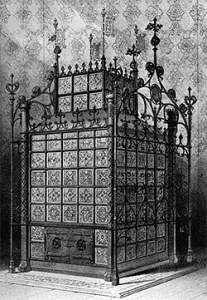 I’ve been reading A.C. Grayling’s biography of Descartes: he advances the novel theory that Descartes was a spy. This is actually a rather shrewd suggestion which makes quite a lot of sense given Descartes’ wandering, secretive life. On balance I think he probably wasn’t conducting secret espionage missions – it’s unlikely we’ll ever know for sure, of course – but I think it’s certainly an idea any future biographer will have to address.
I’ve been reading A.C. Grayling’s biography of Descartes: he advances the novel theory that Descartes was a spy. This is actually a rather shrewd suggestion which makes quite a lot of sense given Descartes’ wandering, secretive life. On balance I think he probably wasn’t conducting secret espionage missions – it’s unlikely we’ll ever know for sure, of course – but I think it’s certainly an idea any future biographer will have to address.
I was interested, though, to see what Grayling made of the stove. Descartes himself tells us that when held up in Germany by the advance of winter, he spent the day alone in a stove, and that was where his radical rebuilding of his own beliefs began. This famous incident has the sort of place in the history of philosophy that the apple falling on Newton’s head has in the history of science: and it has been doubted and queried in a similar way. But Descartes seems pretty clear about it: “je demeurais tout le jour enfermé seul dans un poêle, où j’avais tout le loisir m’entretenir de mes pensées”.
Some say it must in fact have been a bread-oven or a similarly large affair: Descartes was not a large man and he was particularly averse to cold and disturbance, but it would surely have to have been a commodious stove for him to have been comfortable in there all day. Some say that Bavarian houses of the period had large stoves, and certainly in the baroque palaces of the region one can see vast ornate ones that look as if they might have had room for a diminutive French philosopher. Some commonsensical people say that “un poêle” must simply have meant a stove-heated room; and this is in fact the view which Grayling adopts firmly and without discussion.
Personally I’m inclined to take Descartes’ words at face value; but really the question of whether he really sat in a real stove misses the point. Why does Descartes, a rather secretive man, even mention the matter at all? It must be because, true or not, it has metaphorical significance; it gives us additional keys to Descartes’ meaning which we ought not to discard out of literal-mindedness. (Grayling, in fairness, is writing history, not philosophy.)
For one thing Descartes’ isolation in the stove functions as a sort of thought-experiment. He wants to be able to doubt everything, but it’s hard to dismiss the world as a set of illusions when it’s battering away at your senses: so suppose we were in a place that was warm, dark, and silent? Second, it recalls Plato’s cave metaphor. Plato had his unfortunate exemplar chained in a cave where his only knowledge of the world outside came from flickering shadows on the wall; he wanted to suggest that what we take to be the real world is a similarly poor reflection of a majestic eternal reality. Descartes wants to work up a similar metaphor to a quite different conclusion, ultimately vindicating our senses and the physical world; perhaps this points up his rebellion against ancient authority. Third, in a way congenial to modern thinking and probably not unacceptable to Descartes, the isolation in the stove resembles and evokes the isolation of the brain in the skull.
The stove metaphor has other possible implications, but for us the most interesting thing is perhaps how it embodies and possibly helped to consolidate one of the most persistent metaphors about consciousness, one that has figured strongly in discussion for centuries, remains dominant, yet is really quite unwarranted. This is that consciousness is internal. We routinely talk about “the external world” when discussing mental experience. The external world is what the senses are supposed to tell us about, but sometimes fail to; it is distinct from an internal world where we receive the messages and where things like emotions and intentions have their existence. The impression of consciousness being inside looking out is strongly reinforced by the way the ears and the brain seem to feed straight into the brain: but we know that impression of being located in the head would be the same if human anatomy actually put the brain in the stomach, so long as the eyes and ears remained where they are. In fact our discussions would make just as much sense if we described consciousness as external and the physical world as internal (or consciousness as ‘above’ and the physical world as ‘below’ or vice versa)
If we take consciousness to be a neural process there is of course, a sense in which it is certainly in the brain; but only in the sense that my money is in the bank’s computer (though I can’t get it out with a hammer) or Pride and Prejudice is in the pages of that book over there (and not, after all, in my head). Strictly or properly, stories and totals don’t have the property of physical location, and nor, really, does consciousness.
Does it matter if the metaphor is convenient? Well, it may well be that the traditional inside view encourages us to fall into certain errors. It has often been argued (and still is) for example that because we’re sometimes wrong about what we’re seeing or hearing, we must in fact only ever see an intermediate representation, never the real world itself. I think this is a mistake, but it’s one that the internal/external view helps to make plausible. It may well be, in my opinion, that habitually thinking of consciousness as having a simple physical location makes it more difficult for us to understand it properly.
So perhaps we ought to make a concerted effort to stop, but to be honest I think the metaphor is just too deeply rooted. At the end of the day you can take the thinker out of the stove, but you can’t take the stove out of the thinker.


 There’s an illuminating
There’s an illuminating 